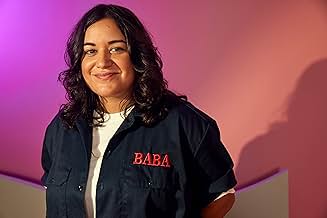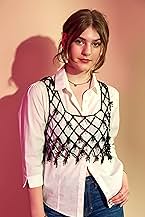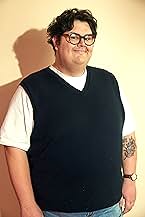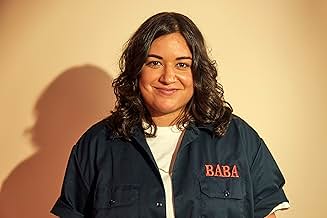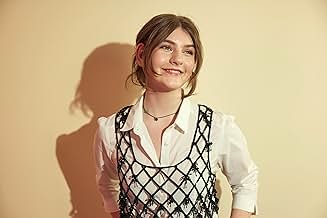AVALIAÇÃO DA IMDb
6,5/10
4,3 mil
SUA AVALIAÇÃO
Sam, uma comediante de stand-up que luta contra o transtorno de estresse pós-traumático, pondera se deve ou não participar da busca por uma adolescente desaparecida da qual ela foi babá.Sam, uma comediante de stand-up que luta contra o transtorno de estresse pós-traumático, pondera se deve ou não participar da busca por uma adolescente desaparecida da qual ela foi babá.Sam, uma comediante de stand-up que luta contra o transtorno de estresse pós-traumático, pondera se deve ou não participar da busca por uma adolescente desaparecida da qual ela foi babá.
- Direção
- Roteirista
- Artistas
- Prêmios
- 8 indicações no total
Avaliações em destaque
10ashestep
Holy moly, guacamole, dude-this movie absolutely blew me away. Hands down, it's the most powerful and realistic portrayal of PTSD from rape and assault that I've ever seen. It doesn't shy away from the raw, gut-wrenching reality of trauma, and honestly, I felt every second of it. The flashbacks were intense, hitting me hard, but that only proves how well this film captured the experience. It wasn't just a story-it was a visceral, emotional journey.
Caleb was such a compelling side character, providing just the right balance of support without overshadowing the depth of the protagonist's struggle. And Rachel? She was beyond perfect for this role. She didn't just act-she became this character, making every emotion feel heartbreakingly real. I need to see more of them working together because their chemistry was undeniable, and they brought so much authenticity to the screen.
Movies like this are so important. They spark conversations, they validate survivors, and they don't sugarcoat the truth. I need more films like this-stories that don't just entertain but matter. Keep them coming.
Caleb was such a compelling side character, providing just the right balance of support without overshadowing the depth of the protagonist's struggle. And Rachel? She was beyond perfect for this role. She didn't just act-she became this character, making every emotion feel heartbreakingly real. I need to see more of them working together because their chemistry was undeniable, and they brought so much authenticity to the screen.
Movies like this are so important. They spark conversations, they validate survivors, and they don't sugarcoat the truth. I need more films like this-stories that don't just entertain but matter. Keep them coming.
IUTBF is a tough movie to love. I guess you would have to live in the disillusioned LA Gen Z bubble to understand any of the characters or their motivations. Cinema is best defined as an empathy creating machine but this movie made me feel nothing.
The issue is mostly the awkward, stilted conversations in the screenplay. The opaque plot doesn't help. The flashback scenes provide some drama but also make the whole film seem like a Greek tragedy.
The direction is actually fairly effective, the acting, however, is not. Some of the characters will be grating to a 'normal' audience. Hence the need for the bubble.
I never thought that a movie about a stand up comic could be so laugh free.
The issue is mostly the awkward, stilted conversations in the screenplay. The opaque plot doesn't help. The flashback scenes provide some drama but also make the whole film seem like a Greek tragedy.
The direction is actually fairly effective, the acting, however, is not. Some of the characters will be grating to a 'normal' audience. Hence the need for the bubble.
I never thought that a movie about a stand up comic could be so laugh free.
I think the movie 'Funny People' gave me PTSD for movies about comedians. I didn't enjoy that movie much at all and I think I was worried I was going to have a similar experience with 'I Used to be Funny'. That couldn't have been further from the case though. I was glued to the screen for every minute of this film.
Rachel Sennott has been one of the most interesting actresses to watch in recent years, but this film gave her the chance to prove she can truly act in a dramatic role. And she killed it. Also I had never heard of Caleb Hearon until this week and yet now I've seen him steal the show in two films. He has a lot of charm that man.
This is a heavy film. It's gritty and raw and quite devastating at times. I loved the structure of the film, with the intersecting timelines and the mystery around what exactly happened. I will say you have to have your wits about you at times to keep on track of which timeline you are actually in.
I really enjoyed this film. I'm quite surprised to be honest to see it with only a 6.3/10 on IMDb. I feel like I must've seen something in it that others didn't. I highly recommend this one though. 9/10.
Rachel Sennott has been one of the most interesting actresses to watch in recent years, but this film gave her the chance to prove she can truly act in a dramatic role. And she killed it. Also I had never heard of Caleb Hearon until this week and yet now I've seen him steal the show in two films. He has a lot of charm that man.
This is a heavy film. It's gritty and raw and quite devastating at times. I loved the structure of the film, with the intersecting timelines and the mystery around what exactly happened. I will say you have to have your wits about you at times to keep on track of which timeline you are actually in.
I really enjoyed this film. I'm quite surprised to be honest to see it with only a 6.3/10 on IMDb. I feel like I must've seen something in it that others didn't. I highly recommend this one though. 9/10.
Ally Pankiw's feature debut "I Used to be Funny" competently explores fragile experiences of depression and PSTD, recovering from assault, and child endangerment with a tame dose of fragile drama, sprinkled with witty humour.
Pankiw's choice to present the story through sequencing between Sam's mission to find a missing Brooke, the young girl she nannied, and frequent flashbacks of memories of the two's once-close bond. While the concept of a non-linear narrative is meant to efficiently expand the dynamics and pasts of the characters and their journeys, which it technically achieves for the majority of the film. The beginning of this sequence felt static as the vague nature that shrouded the connection between Sam, her trauma, and her past with Brooke, overstayed its welcome in the first third of the story. However, the pace thankfully accelerates once the first clues of Brooke's disappearance are uncovered.
Some elements of the film at times, lean too hard into melodrama that lacks actual substance, especially in the vague and unmoving first third of the film. Cuts to some flashbacks that felt somewhat cliche a script that at times felt too expository, and perhaps two-too-many Phoebe Bridgers needle drops; tools that ask the audience to engage with the characters and the mysterious tragedy that haunts them. These elements may have been appropriate in the context of a television episode, considering Pankiw's background in TV direction, but unfortunately fell flat within a full-length feature film.
Amidst these faults, one of the film's greatest strengths is its talented cast. Rachel Sennott's has not only cemented herself as a star of off-beat and relatable comedy but also demonstrated a striking capacity for performances filled with intense vulnerability, harmoniously embodying all relevant elements of the tragicomedy genre. Her ability to foster chemistry with the rest of the cast only adds further dimension to the sorrow and humor that defines her character's journey.
Overall, I Used to Be Funny poses an intimate image of how trauma can take control of our lives and sense of self-worth. While bleak, the potential for healing is also presented as the empathetic and hopeful conclusion to Sam and Brooke's journey. While the film's approach at times lacks the ingenuity and impact it clearly intended to bring, it remains that Pankiw's strength lies in how she stays firm with the difficult themes and issues she addresses.
Pankiw's choice to present the story through sequencing between Sam's mission to find a missing Brooke, the young girl she nannied, and frequent flashbacks of memories of the two's once-close bond. While the concept of a non-linear narrative is meant to efficiently expand the dynamics and pasts of the characters and their journeys, which it technically achieves for the majority of the film. The beginning of this sequence felt static as the vague nature that shrouded the connection between Sam, her trauma, and her past with Brooke, overstayed its welcome in the first third of the story. However, the pace thankfully accelerates once the first clues of Brooke's disappearance are uncovered.
Some elements of the film at times, lean too hard into melodrama that lacks actual substance, especially in the vague and unmoving first third of the film. Cuts to some flashbacks that felt somewhat cliche a script that at times felt too expository, and perhaps two-too-many Phoebe Bridgers needle drops; tools that ask the audience to engage with the characters and the mysterious tragedy that haunts them. These elements may have been appropriate in the context of a television episode, considering Pankiw's background in TV direction, but unfortunately fell flat within a full-length feature film.
Amidst these faults, one of the film's greatest strengths is its talented cast. Rachel Sennott's has not only cemented herself as a star of off-beat and relatable comedy but also demonstrated a striking capacity for performances filled with intense vulnerability, harmoniously embodying all relevant elements of the tragicomedy genre. Her ability to foster chemistry with the rest of the cast only adds further dimension to the sorrow and humor that defines her character's journey.
Overall, I Used to Be Funny poses an intimate image of how trauma can take control of our lives and sense of self-worth. While bleak, the potential for healing is also presented as the empathetic and hopeful conclusion to Sam and Brooke's journey. While the film's approach at times lacks the ingenuity and impact it clearly intended to bring, it remains that Pankiw's strength lies in how she stays firm with the difficult themes and issues she addresses.
I found the description of this movie to be deceptive. The story is about a former comedian where something happened that derailed her life.
The description says PSTD but what this trauma event is it not immediately revealed. The movie spends the three quarters of the time dancing around something having happened.
The dialog tries to be hip about teenage topics but it is mostly just cringe. No cap.
Much of the story is told as flash backs interweaved into the present so such it's never really clear when anything is occurring until several beats into a scene. I found this all irritating and bad story telling.
The movie eludes to what may have happened and while it's possible to guess, it's makes it all the worse that they don't just say it.
Everyone in the movie knows what happened but we are left out of being shared the details. Conversations about the event happen over and over to the point of becoming fraying, like an inside joke that no one will explain to you until you start to wonder if the pay off will be worth it.
It won't.
This fake tension is bad story telling. There is a missing child and the description creates a narrative that this is a big part of the movie but it's simply not. Our main character spends most of the movie unconcerned about the child's whereabouts. Its only purpose is to provide an ending to an otherwise meandering mess of a movie.
The description says PSTD but what this trauma event is it not immediately revealed. The movie spends the three quarters of the time dancing around something having happened.
The dialog tries to be hip about teenage topics but it is mostly just cringe. No cap.
Much of the story is told as flash backs interweaved into the present so such it's never really clear when anything is occurring until several beats into a scene. I found this all irritating and bad story telling.
The movie eludes to what may have happened and while it's possible to guess, it's makes it all the worse that they don't just say it.
Everyone in the movie knows what happened but we are left out of being shared the details. Conversations about the event happen over and over to the point of becoming fraying, like an inside joke that no one will explain to you until you start to wonder if the pay off will be worth it.
It won't.
This fake tension is bad story telling. There is a missing child and the description creates a narrative that this is a big part of the movie but it's simply not. Our main character spends most of the movie unconcerned about the child's whereabouts. Its only purpose is to provide an ending to an otherwise meandering mess of a movie.
Você sabia?
- CuriosidadesDirector Ally Pankiw was dating Muna member Naomi McPherson during the production of the film, but have since broken up. Naomi is still second to the top of special thanks during credits, and two Muna songs feature during the film.
Principais escolhas
Faça login para avaliar e ver a lista de recomendações personalizadas
- How long is I Used to Be Funny?Fornecido pela Alexa
Detalhes
Bilheteria
- Faturamento bruto nos EUA e Canadá
- US$ 171.756
- Fim de semana de estreia nos EUA e Canadá
- US$ 29.499
- 9 de jun. de 2024
- Faturamento bruto mundial
- US$ 171.756
- Tempo de duração
- 1 h 45 min(105 min)
- Cor
- Proporção
- 2.00 : 1
Contribua para esta página
Sugerir uma alteração ou adicionar conteúdo ausente




